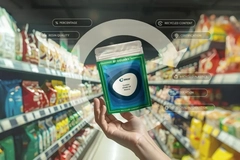
US researchers have developed a novel method to recycle soiled pizza boxes using dimethyl ether (DME), a condensable hygroscopic gas, that enables the removal of contaminants from heavily soiled packaging.
Though made of fiber-based corrugated cardboard, pizza contaminants such as sauces and oils complicate the reuse of pizza boxes, resulting in municipal prohibitions on the recycling of used pizza boxes in cardboard recycling streams.
The study, published in the Journal of Cleaner Production, indicates that DME solubilizes and extracts components from contaminated cardboard, leaving it drier than unused cardboard and ready for recycling.
Aaron Wilson, the principal investigator for the pizza box experiment at Idaho National Laboratory, US, says: “Material separation will be important for reducing waste across the energy and defense industries. To make specific separations possible, we need to first prove the overall concept of material separations, which is what this study accomplished.”

“With the reactor process, we were able to extract the contaminants into separate fractions. We had a fraction dominated by oils, one dominated by water, and one dominated with dryer solids.”
Battlefield waste recovery
The research suggests that DME-soluble can be separated into aqueous and fatty acid or oil fractions. These extracted components could amount to approximately 30 kg of recoverable fat, oil, and greases per US household per year, while yielding up to 110 kg of useful dry and de-oiled solids.
The effort to separate grease, cheese, and other contaminants from pizza boxes began as part of the US Defense Advanced Research Projects Agency’s (DARPA) ReSource Program, which aims to convert warfighter waste such as plastics into edible macronutrients and other useful items.
Jeff Lacey, the principal investigator for DARPA, comments: “Knowing that this works for the highly contaminated pizza boxes has helped validate the system for use in the battlefield. The biggest challenge now will be making the system lighter.”
“Idaho National Laboratory started with this pizza box case study because most people care about properly recycling food waste. But ultimately, this research has so many possible applications for national security and a net-zero future,” he concludes.












